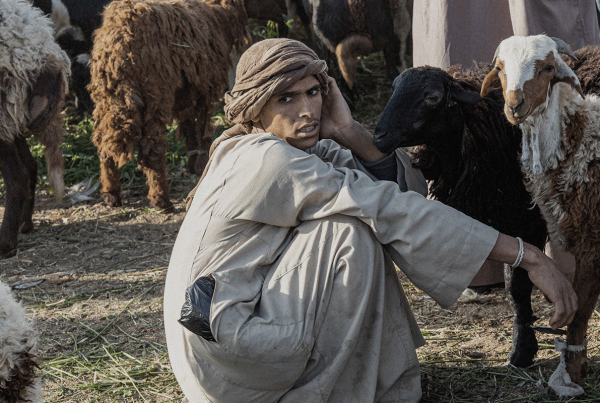Nandita* left her home, her parents, and traveled hours across the vast country of India with the promise of a new job and the possibility of a future that held opportunity. She had so little as a child. She had never attended school, and now, as a young woman, she was eager for work and a new chapter in her life. But Nandita had unknowingly fallen prey to a lie. She was delivered to a hotel brothel, and her body was sold to multiple “customers” a day. The days became weeks.
Meanwhile, The Exodus Road’s Team of national operatives obtained the proof needed by local law enforcement of Nandita’s trafficking. In the course of their investigations, they also found evidence of three other women and two teenage boys. The team worked with local police and helped with the rescue mission for Nandita and the five others suffering abuse.
Thankfully, The Exodus Road also had crisis care workers on site during the mission — an event which is often full of chaos and confusion for the victims. They gave intentional care to the survivors and met immediate needs while the survivors’ testimonies were processed at the police station and their traffickers were arrested.
Soon after the rescue mission, Nandita and the remaining survivors were placed in the care of the Social Welfare Department where each person was kept safe, given basic medical evaluations, and evaluated for further services, such as repatriations, home evaluations, or education or job training resources.
While Nandita was rescued from a brothel that day, her journey towards true freedom was really only just beginning.
The Exodus Road and Aftercare
Human trafficking rescue is truly the first step in a long journey towards true restoration and healing. While The Exodus Road’s core competency and primary focus initially was to support police in finding and freeing those caught in human trafficking, we also believe in the critical role of aftercare for survivors. These courageous men, women, and children have endured incredible abuse and need specialized care and resources to be restored to healthy, secure lives as members of their own communities. It’s with these survivors in mind that we continue to push forward our Beyond Rescue program in the countries where we operate. Currently, here are the primary ways we invest in survivor care at The Exodus Road.
#1 We employ social workers to provide crisis care.
We employ local social workers/crisis care workers as an integral part of our Search + Rescue teams in each country where we work. Arrest of the traffickers and rescue of the survivors can be a disorienting, traumatic experience, and the social workers are typically present to assure survivors of their safety, answer questions, meet immediate needs, and clarify that the survivors are not under arrest. These nationals (mostly female) also provide follow-up and individualized care, as they are able. Social workers are primarily part of TER staff, but there are some instances where we contract or support social workers in partnering after care organizations.
#2 We operate a safe house and mentorship program for survivors in Thailand.
The Freedom Home is a key survivor-centered project in Thailand. Utilizing a trauma-informed approach, this home operates as a safe house for adult female survivors to provide immediate emergency services. We also offer a year-long mentorship program to offer women healing, empowerment, and sustainable living opportunities. This program includes life skills coaching, trauma therapy, education, internships, job skills training and business training, if desired, and is completely run by a national team of committed professionals.
#3 We support unique survivor needs through our Survivor Care Fund.
Every survivor is unique, and so are his or her needs. To that end, we have and operate a Survivor Care Fund to meet the specific needs of those we meet on the front lines. This funding could cover expenses like medical care, repatriation or legal services following an operation, housing or educational expenses, food or rent. The fund is managed by leadership in each country where we operate and is designed to meet specific, usually immediate and short-term needs.
#4 We support other NGOs in aftercare work.
We support efforts of local aftercare shelters in countries where we work that specialize in caring for human trafficking victims. These vetted partners provide trauma-informed programming that helps survivors heal and empower their new journeys. We support projects at these partnering organizations such as providing: grant funding, legal fees, capital expenses, specific needs of survivors, educational fees, and other resources to improve the quality of life for those in the care of the organization.
Many survivors are placed directly in the care of the local Social Welfare Departments in Thailand, India, and Latin America. The length of time each survivor spends under the care of the government shelters depends on each person’s situation, age, and the resources available. If the situation allows, we will offer support and services for the local Welfare Departments to help care for survivors, as well.
Survivor Care Makes Strategic Impact
While aftercare in human trafficking work is complex and challenging, it is critically important. Traffickers prey on the vulnerable, and these vulnerabilities must be met in order for survivors to move from victimhood to true health and wholeness. When survivors have what they need to provide for themselves and to walk forward in healing, generational cycles are broken, creating a ripple effect of empowerment.
We know for survivors like Nandita, her story of true freedom is only just beginning with the moment of rescue. And, we at The Exodus Road, are excited to be part of her next steps, too.
If you’d like to learn more about aftercare, read a few survivor stories or check out more information on our Beyond Rescue program.
*Name is representational







